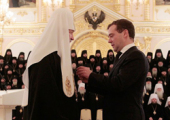Moscow, February 3, 2011

|
| President Dimitry Medvedev awards His Holiness Patriarch Kirill with the Order of St. Alexander Nevsky. |
“The state (maybe for the first time in the history of our government as a whole, and for the first time for the more than thousand-year history of our state and Orthodoxy in Russia), does not interfere in the work of religious organizations, and at the same time recognizes the contributions of the Church in the establishment of Russian statehood, the development of national Russian culture and the confirmation of spiritual-moral values in society. Together we decide the most important challenges and the most pressing problems in the life of our people,” said President Medvedev in his address to the hierarchs of the Russian Orthodox Church. He stressed the special role the Church plays in supporting inter-ethnic and inter-confessional peace, the development of inter-religious dialog and preservation of fundamental values.
His Holiness Patriarch Kirill then addressed the participants in the Council. According to His Holiness, the members of the Council of Bishops represent not only the 22 nations they hail from, but the Russian Orthodox world, which exists in 60 countries of the world. “The challenges now being discussed by the Council of Bishops relate to the entire Church, and therefore to many countries,” His Holiness pointed out. “But since every country has its own specific aspects, the documents being adopted by the Council of Bishops bear a fundamental character, assuming the possibility of articulating them in concrete situations, as suited to the needs of the Church.”
The Primate also noted that most of the faithful of the Russian Orthodox Church live in the Russian Federation, and that everything that is happening in the country, including church-state relations, influences the situation in different countries. Among the examples of the successful cooperation between the Church and Russian Federation, Patriarch Kirill said, was the adoption of the law last year on the transfer of religious properties to religious organizations, as well as an experiment in the teaching in schools of the foundations of religious culture and lay ethics, which, according to independent sociologist, is widely supported by the population.
His Beatitude Metropolitan Vladimir of Kiev and All Ukraine shared his thoughts on various aspects of church-state relations, as did His Eminence Metropolitan Hilarion, President of the Synod of Bishops of the Russian Orthodox Church Outside of Russia; His Grace Bishop Panteleimon of Orekhovo-Zuevsk, President of the Synodal Department of Church Charity and Social Work; His Eminence Archbishop Kirill of Yaroslavl’ and Rostov; His Grace Bishop Daniil of Arkhangel’sk and Kholmgorsk; His Grace Bishop Feofilakt of Smolensk and Vyzemsk and His Eminence Archbishop Veniamin of Vladivostok and Primorsk.
Metropolitan Hilarion remarked that the Russian Church Abroad always teaches its flock to profoundly love and respect Russia and her spiritual legacy, and expressed hope that the Russian government would attentively meet the needs of the many millions of Russians in the diaspora who are now threatened by quick assimilation and the loss of their ties to their historic Homeland.
“Today, the social service of the Church involves thousands of young, educated, talented and entrepreneurial people,” noted Bishop Panteleimon. “It would seem to me that including these people in the sphere of care for our citizens is very important for the government, and not only care for the needy.” According to Vladyka Panteleimon, the Church has something to offer to the state in the area of helping difficult teens, the homeless and drug addicts. At the same time, the President of the Synodal Department on Church Charity expressed the desire that the state offer support to the Church’s initiatives, for instance, in protecting motherhood.
Problems at the border regions of Russia, where pseudo-religious organizations from abroad aggressively proselytize, were the topic of discussion raised by Bishop Daniil. Vladyka also spoke about the development of a church-state program on educating the small native populations of the North, Siberia and the Far East.
Vladyka Feofilakt touched upon matters pertaining to the Church and state cooperating to resolve problems in international relations and the integration of migrants.
Archbishop Veniamin spoke with alarm about the low quality of much of the mass media, especially on the Internet, and called for the consideration of making television “an important tool for the spiritual and moral transformation of Russia.”
In conclusion, His Holiness thanked the President for his “informal, creative and very important dialog with the episcopacy of the Russian Orthodox Church,” and also for the possibility he gave the archpastors “to speak out on what lies in their hearts, and to receive exhaustive answers from the head of the Russian State.”
“I wish to assure you that we are fully prepared to cooperate on all levels, so that the important ideas, including those expressed today, would be the legacy of our life,” said His Holiness Patriarch Kirill to President Medvedev.
The participants of the meeting then proceeded to Alexandrovsky Hall, where His Holiness Patriarch Kirill was awarded the State Order of St Alexander Nevsky.
Press Service of the Patriarch of Moscow and All Russia
